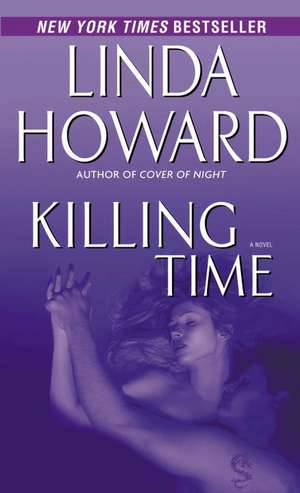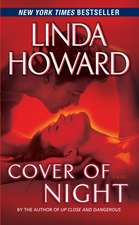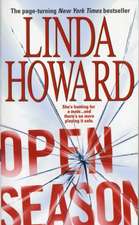Killing Time
Autor Linda Howarden Limba Engleză Paperback – 31 mai 2006
In 1985, with much fanfare, a time capsule was buried under the front lawn of a small-town county courthouse, to be reopened in 2085. But just twenty years later, in the dead of night, the capsule is dug up, its contents stolen. That same night, one of the contributors to the capsule is brutally slain in his home–with no sign of forced entry or indication of a struggle. One by one, others who had placed items in the time capsule are murdered.
Besides his suspicions about the sudden, mysterious appearance of Nikita Stover, the chief investigator, Knox Davis, has absolutely no leads. And while Nikita’s no murderer, she seems to be hiding plenty of secrets. With more at stake than anyone else realizes, the smart-talking Nikita is determined to catch this cunning killer–while at the same time battling her own deepening feelings for a man and for a world in which she doesn’t belong.
When readers crave a seductive novel of unrelenting suspense with a paranormal twist, Linda Howard delivers time and again . . . make that Killing Time–a captivating, character-rich story that races along on a breathless plot full of action and intimacy, romance and danger, thrills and intrigue.
From the Hardcover edition.
Preț: 49.30 lei
Nou
Puncte Express: 74
Preț estimativ în valută:
9.43€ • 9.84$ • 7.84£
9.43€ • 9.84$ • 7.84£
Carte disponibilă
Livrare economică 28 februarie-14 martie
Preluare comenzi: 021 569.72.76
Specificații
ISBN-13: 9780345453464
ISBN-10: 0345453468
Pagini: 363
Dimensiuni: 108 x 175 x 28 mm
Greutate: 0.2 kg
Editura: BALLANTINE BOOKS
ISBN-10: 0345453468
Pagini: 363
Dimensiuni: 108 x 175 x 28 mm
Greutate: 0.2 kg
Editura: BALLANTINE BOOKS
Notă biografică
Linda Howard is the award-winning author of many New York Times bestsellers, including To Die For, Kiss Me While I Sleep, Cry No More, Dying to Please, Open Season, Mr. Perfect, All the Queen’s Men, Now You See Her, Kill and Tell, and Son of the Morning. She lives in Alabama with her husband and two golden retrievers.
From the Hardcover edition.
From the Hardcover edition.
Extras
June 27, 2005
“Hey, Knox, who dug that hole next to the flagpole?”
Knox looked up from the report he was writing. As chief county investigator, he had his own office, though it was small and crowded. Deputy Jason MacFarland was leaning in through the open door, the expression on his freckled face only mildly curious.
“What hole next to the flagpole?”
“I’m telling you, there’s a hole next to the flagpole. I’d swear it wasn’t there yesterday afternoon when my shift was over, but one’s there now.”
“Huh.” Knox rubbed his jaw. He himself hadn’t noticed, because he’d parked behind the courthouse when he came in this morning at four-thirty to wade through an ass-deep pile of paperwork. He’d been up all night, and he was so tired he might not have noticed even if he’d walked right by the supposed hole.
Having been sitting at his desk for three hours, he figured he needed to stretch his legs a bit. Grabbing his coffee cup, he refilled it as he passed by the coffeemaker, and he and Deputy MacFarland went out the side door, then walked around the side of the redbrick courthouse building to the front, their rubber-soled shoes quiet on the sidewalk. The new day was showing a cloudless blue sky, and the lush green grass was wet with dew. Colorful banks of spring flowers grew in carefully tended beds, but Knox would have been hard put to name any of them. He knew roses, and daffodils. Everything else was lumped under the general designation of “flowers.”
The courthouse opened at eight, and the back parking lot was rapidly filling with employees’ cars. The sheriff’s department had a separate wing on the right of the courthouse, and the county jail occupied the top two stories of the five-story building. The prisoners used to catcall down to the female employees and visitors to the courthouse, until the county installed slats over the windows that let in air and light but effectively blocked the prisoners’ view of the parking lot below.
The flagpole was on the left front corner of the courthouse square; park benches faced the street on both sides of the corner, and there were more of the neat flower beds. Today there wasn’t any wind; the flags hung limply. And at the base of the flagpole was a nice-sized hole, about three feet wide and two deep.
Knox and the deputy stayed on the sidewalk; they could easily see from there. A granite slab had been flipped upside down and lay in the grass. The dirt was scattered more than seemed strictly necessary for digging a simple hole. “That was the time capsule,” Knox said, and sighed. This was just the kind of shit high school kids would do, but it ate at his time just like any other crime.
“What time capsule?” MacFarland asked.
“There was a time capsule buried . . . hell, it was twenty years ago: 1985. I watched them bury it on New Year’s Day.”
“What was in it?”
“I don’t remember, but nothing struck me at the time as being valuable. Things like a copy of the newspaper, a yearbook, some music and things.” He did remember that the newspaper hadn’t listed everything in the capsule, though, and in retrospect he was still pissed off about it.
“Bunch of kids, most likely,” MacFarland said. “Thought stealing a time capsule would be funny.”
“Yeah.” Out of habit, Knox surveyed the surrounding ground. There were no footprints in the dew, which meant the van- dals had struck hours ago. He stepped up on one of the park benches so he could get a better view, and said, “Huh.”
“What is it?”
“Nothing. No footprints.” The way the fresh dirt was scattered around, there should have been at least a partial footprint caught somewhere. But the dirt looked as if it had burst up out of the ground, rather than been dug up and tossed with a shovel. The flagpole was no more than ten feet distant from the park bench, so he had a very good view; there was no way he was overlooking any prints. There simply weren’t any.
MacFarland climbed up on the bench beside him. “Don’t that beat all,” he said, after staring at the ground for at least thirty seconds. “How’d they manage that? I wonder.”
“God only knows.” He’d find out, though. Because the county jail was located at the courthouse, every corner of the building was equipped with a security camera, tucked up high under the eaves and painted to blend in with the building. Unless a person knew the cameras were there, he’d have a tough time spotting them.
He still had that report to finish, but the lack of footprints around the hole fired his curiosity. Now he had to know just how the little bastards had managed to dig up the time capsule with a streetlight right there on the corner shining down on them, but with no one seeing them and without leaving any prints in the fresh dirt. Maybe First Avenue, the street right in front of the courthouse, didn’t have all that much traffic on it during the wee hours, but there were always patrol cars coming and going. Someone should have seen something and reported it.
He looked across the street at the hardware store where he and his dad had lived; after he’d gone off to college, his dad had finally gotten serious about someone and remarried about ten years ago. Knox liked Lynnette just fine, and was glad Kelvin wasn’t alone. Lynnette hadn’t wanted to live above the store, though, so they’d bought a house out in the country. If Kelvin had still lived there, Knox thought, no kids would have managed to do anything without Kelvin noticing, because his bedroom had looked out over the square.
“Put some tape around the scene, keep people from tromping all over it,” he instructed MacFarland.
MacFarland could have argued that there was nothing there but a hole, and that a missing time capsule didn’t have any great value anyway—certainly not enough value to justify an investigation—but he merely nodded. Telling Knox when to back off was the sheriff’s job, not his; besides, Knox was a source of great amusement to the deputies, who sometimes made bets on how far he would go to solve a puzzle.
He and MacFarland retraced their steps around the courthouse to the sheriff’s department, where they parted company: MacFarland to carry out his instructions, and Knox to the jail, where the security cameras were manned.
“Manned” was a loose term, because more accurately they were “womanned,” by a six-foot, fierce-eyed woman named Tarana Wilson, who kept fanatical watch over her domain. Her facial features were carved and strong, her skin burnished like dark bronze, and she had a brown-belt in martial arts. Knox strongly suspected she could kick his ass.
Because a smart man never approached a queen without bearing gifts, Knox snagged a cream-filled doughnut out of the break room and poured two fresh cups of coffee, one for himself and one in a disposable cup. Gifts in hand, he went up the stairs.
He had to stop and identify himself; then he was buzzed into the jailor’s offices.
The actual cells were on the floors above, and access to those floors was rigidly controlled. They hadn’t had a breakout in at least fifteen years. Not that Peke County had any real hard cases in the county lockup; the hard cases were in state prisons.
The door to Tarana’s office was open, and she was pacing in front of a bank of ten black-and-white monitors. She seldom just sat; she seemed to be constantly on the move, as if too much energy burned in her lean, long-muscled body for her to sit still.
“Hey, T.,” Knox said as he strolled in, extending the cup of coffee.
She eyed the cup suspiciously, then looked back at the monitors. “What’s that?”
“Coffee.”
“What’re you bringing me coffee for?”
“To stay on your good side. I’m afraid of you.”
That brought her dark, narrow-eyed gaze swinging back to him. “Liar.”
“Okay, so I really have the hots for you and this is my way of softening you up.”
A faint smile curved her mouth. She took the cup of coffee and sipped it as she studied the monitors. “It might work, too, if me and my sisters hadn’t sworn an oath to stay away from white boys.”
He snorted, then extended the doughnut. “This is for you, too.”
“Now I’m gettin’ scared you really meant that about softening me up, but I got news for you: it takes more than any doughnut to do the job.”
“It’s cream-filled.”
“Oh, well then, I might have to rethink my position.” She grabbed the doughnut and took a big bite out of it, squishing white cream out both sides of the pastry. She licked the cream filling before it could splat to the floor, her attention never leaving the monitors.
“Now then, what can I do for you?”
“See the flagpole?” he asked, pointing at the appropriate monitor.
“Yeah, what about it?”
“There’s a hole in front of it, where the time capsule used to be buried.”
“Used to be?”
“Somebody dug it up last night.”
“Son of a bitch. Somebody stole our time capsule? I didn’t know we had one, but never mind that.”
“I need to see the tape from last night.”
“Coming right up. That’s just trashy, stealing a town’s time capsule.”
In short order Knox was sitting in front of a spare monitor, rewinding the security tape and watching as everything went backward. He saw himself and MacFarland, then time spooled backward and dawn disappeared. Traffic had been light, as he expected. What he didn’t expect, though, was to see no one approach the flagpole and spend a few minutes digging a hole. Not a single person approached. He was all the way back to sunset when he stopped the tape, frowning.
“You find the low-down rotten bastard?” Tarana drawled without looking at him, because she was still visually patrolling her monitors.
“Nope.” Looking closely at the frozen image, he could plainly see that the granite marker was in place and the ground undisturbed at eight-thirty pm. The rich green grass was neatly trimmed around the marker.
“What do you mean, no?”
“I mean I didn’t see anybody.”
“Don’t tell me somebody done dug up that time capsule a week ago, and you boys have just noticed.”
“According to your tape, it was still there at sunset yesterday.”
She wheeled, stared at the image. “If it was there yesterday, then whoever took it’s on that tape.”
“I didn’t see anyone,” he repeated patiently, and fast- forwarded through to dawn to show her. When he stopped the tape, they could see the hole at the base of the flagpole and the granite marker flipped off to the side. A ferocious frown pulled her brows together.
“Run it again,” she snapped, coming to stand behind him.
He did, rewinding the tape yet again, and this time doing periodic stops of the tape to see when the vandalism first appeared. At 2:30 am, the hole was there. When he stopped it again, at 1:53 am, the site was undisturbed.
“Now run it in real time,” she said, dragging a chair over. She gave her monitors a quick look, then settled her attention on the tape playing in front of her.
Knox punched Play and the time-counter began clicking forward a second at a time. Seven minutes later he said, “Shit, what was that?” A brief, white flash had glared on the screen. Then it was gone, and so was the time capsule.
He stopped the tape, hit Rewind, then almost immediately hit Play again. The tape had backed up three minutes. The same thing happened. The ground was undisturbed, then came that white flash, and when it faded, the capsule was gone.
“Somebody’s messing with my camera,” Tarana said in a voice of doom.
“I don’t think so.” Frowning, Knox rewound the tape over those same few crucial minutes. “Watch the timer.”
Together they watched the seconds ticking away. At 2:00 am, the white flash filled the screen. At 2:01 am, the flash faded and the time capsule was gone.
“That’s not possible,” Tarana snapped, surging to her feet and kicking her chair. She turned and glared at all the monitors. “If somebody’s messing with that camera, he can mess with all these, and that ain’t gonna happen.”
Silently Knox watched the sequence again. He hadn’t noticed the flash when he’d been fast-forwarding or rewinding. But it was definitely there, and the granite slab had been in place before the flash but was pushed aside afterward, and the dark hole gaped at the foot of the flagpole.
He rewound the tape all the way. The time display was exactly twenty-four hours before he’d come in here and Tarana had stopped the tape. He didn’t know if anyone could tamper with the tape without messing up the time, or if it was even possible without someone coming into this office, in which case no way had a bunch of high school kids been responsible.
He scratched his jaw. He supposed he could sit with his watch in one hand and time the tape, but that would take twenty-four hours and be boring as hell besides. There was an easier way to get to the bottom of this.
Tarana was stalking back and forth behind him, breathing fire and muttering curses. Knox felt sorry for the next person who came through that door, because, deprived of a definite target, she might just take her ire out on anyone handy.
“I’m going over to the hardware store,” he said, sliding his chair back and grabbing his coffee cup.
“Hardware store? What you going to the hardware store for? You can’t just waltz in here and show me somebody’s been messing with my cameras, then just waltz out again to go buy some nails. You sit back down!”
“Dad has security cameras, too,” Knox said. “One of them is pointed toward the door.”
“So?” she snapped, then realization dawned. “Oh, I gotcha. Glass door, big glass storefront, right across the street from the flagpole.”
He winked at her as he went out the door.
The square was busy now as he crossed the street; peo- ple were coming to the courthouse, taking care of business like car tags, driver’s licenses, boat registrations. Some of the stores were open, including the hardware store; the rest of them opened at nine. MacFarland had strung a nice crime-scene perimeter, blocking off a good twenty yards in either direction from the flagpole, thereby blocking the sidewalk and making people walk around.
The bell above the door dinged when Knox walked in, and Kelvin looked up as he was checking out a customer. “Be with you in a minute, son,” he said.
“Take your time.” Looking up, Knox located the secu- rity camera and turned to follow the alignment. Just as he’d thought, the flagpole was almost dead center opposite the front door. Whoever had done the vandalism might have somehow blocked the courthouse security camera, though he didn’t see how, but this camera was inside the store and hadn’t been tampered with.
The customer left and Knox went over to the checkout counter. “I need to see your security tape,” he said to Kelvin. He nodded out the window. “Somebody dug up the time capsule last night and somehow blocked the courthouse camera. I figure your camera caught the action.”
Kelvin looked up at the camera, following the path the same way Knox had. “Reckon so. I wondered what all that yellow tape was for. That’s the time capsule we watched them bury, right?”
“The same one. Unless they dug it up and buried a fresh one that I don’t know about.”
“Nineteen eighty-five. Southern Cal won the Rose Bowl, and I had to listen to that asshole Aaron for a whole year.”
Kelvin always referred to his brother-in-law Aaron as “asshole Aaron” because he liked the alliteration; he didn’t, however, like his brother-in-law. Reaching beneath the counter, he ejected a tape and handed it over the counter to Knox. “There you go.”
“I don’t know when I’ll get it back.”
“Don’t worry about it. I got extras.”
Tape in hand, Knox went back to his office. He had a small TV/VCR combo and he turned it on, then slipped in the tape. With the remote in his hand, he rewound until he was close to the right time, then in fits and starts until 1:59 am showed on the clock display. The detail wasn’t as good and the glass distorted the view some, but he could make out the square granite marker right where it was supposed to be. He pressed Play and watched. There was always some variance in clocks, so he had no idea how long he’d actually have to watch.
At 2:03:17, there was a white flash. Knox sat up straight, staring at the screen. At 2:03:18, the flash faded. Now the pale square of the granite marker was lying off to the side, and the ground had been disturbed.
“Son of a bitch,” he said softly. “What in hell is going on?”
From the Hardcover edition.
“Hey, Knox, who dug that hole next to the flagpole?”
Knox looked up from the report he was writing. As chief county investigator, he had his own office, though it was small and crowded. Deputy Jason MacFarland was leaning in through the open door, the expression on his freckled face only mildly curious.
“What hole next to the flagpole?”
“I’m telling you, there’s a hole next to the flagpole. I’d swear it wasn’t there yesterday afternoon when my shift was over, but one’s there now.”
“Huh.” Knox rubbed his jaw. He himself hadn’t noticed, because he’d parked behind the courthouse when he came in this morning at four-thirty to wade through an ass-deep pile of paperwork. He’d been up all night, and he was so tired he might not have noticed even if he’d walked right by the supposed hole.
Having been sitting at his desk for three hours, he figured he needed to stretch his legs a bit. Grabbing his coffee cup, he refilled it as he passed by the coffeemaker, and he and Deputy MacFarland went out the side door, then walked around the side of the redbrick courthouse building to the front, their rubber-soled shoes quiet on the sidewalk. The new day was showing a cloudless blue sky, and the lush green grass was wet with dew. Colorful banks of spring flowers grew in carefully tended beds, but Knox would have been hard put to name any of them. He knew roses, and daffodils. Everything else was lumped under the general designation of “flowers.”
The courthouse opened at eight, and the back parking lot was rapidly filling with employees’ cars. The sheriff’s department had a separate wing on the right of the courthouse, and the county jail occupied the top two stories of the five-story building. The prisoners used to catcall down to the female employees and visitors to the courthouse, until the county installed slats over the windows that let in air and light but effectively blocked the prisoners’ view of the parking lot below.
The flagpole was on the left front corner of the courthouse square; park benches faced the street on both sides of the corner, and there were more of the neat flower beds. Today there wasn’t any wind; the flags hung limply. And at the base of the flagpole was a nice-sized hole, about three feet wide and two deep.
Knox and the deputy stayed on the sidewalk; they could easily see from there. A granite slab had been flipped upside down and lay in the grass. The dirt was scattered more than seemed strictly necessary for digging a simple hole. “That was the time capsule,” Knox said, and sighed. This was just the kind of shit high school kids would do, but it ate at his time just like any other crime.
“What time capsule?” MacFarland asked.
“There was a time capsule buried . . . hell, it was twenty years ago: 1985. I watched them bury it on New Year’s Day.”
“What was in it?”
“I don’t remember, but nothing struck me at the time as being valuable. Things like a copy of the newspaper, a yearbook, some music and things.” He did remember that the newspaper hadn’t listed everything in the capsule, though, and in retrospect he was still pissed off about it.
“Bunch of kids, most likely,” MacFarland said. “Thought stealing a time capsule would be funny.”
“Yeah.” Out of habit, Knox surveyed the surrounding ground. There were no footprints in the dew, which meant the van- dals had struck hours ago. He stepped up on one of the park benches so he could get a better view, and said, “Huh.”
“What is it?”
“Nothing. No footprints.” The way the fresh dirt was scattered around, there should have been at least a partial footprint caught somewhere. But the dirt looked as if it had burst up out of the ground, rather than been dug up and tossed with a shovel. The flagpole was no more than ten feet distant from the park bench, so he had a very good view; there was no way he was overlooking any prints. There simply weren’t any.
MacFarland climbed up on the bench beside him. “Don’t that beat all,” he said, after staring at the ground for at least thirty seconds. “How’d they manage that? I wonder.”
“God only knows.” He’d find out, though. Because the county jail was located at the courthouse, every corner of the building was equipped with a security camera, tucked up high under the eaves and painted to blend in with the building. Unless a person knew the cameras were there, he’d have a tough time spotting them.
He still had that report to finish, but the lack of footprints around the hole fired his curiosity. Now he had to know just how the little bastards had managed to dig up the time capsule with a streetlight right there on the corner shining down on them, but with no one seeing them and without leaving any prints in the fresh dirt. Maybe First Avenue, the street right in front of the courthouse, didn’t have all that much traffic on it during the wee hours, but there were always patrol cars coming and going. Someone should have seen something and reported it.
He looked across the street at the hardware store where he and his dad had lived; after he’d gone off to college, his dad had finally gotten serious about someone and remarried about ten years ago. Knox liked Lynnette just fine, and was glad Kelvin wasn’t alone. Lynnette hadn’t wanted to live above the store, though, so they’d bought a house out in the country. If Kelvin had still lived there, Knox thought, no kids would have managed to do anything without Kelvin noticing, because his bedroom had looked out over the square.
“Put some tape around the scene, keep people from tromping all over it,” he instructed MacFarland.
MacFarland could have argued that there was nothing there but a hole, and that a missing time capsule didn’t have any great value anyway—certainly not enough value to justify an investigation—but he merely nodded. Telling Knox when to back off was the sheriff’s job, not his; besides, Knox was a source of great amusement to the deputies, who sometimes made bets on how far he would go to solve a puzzle.
He and MacFarland retraced their steps around the courthouse to the sheriff’s department, where they parted company: MacFarland to carry out his instructions, and Knox to the jail, where the security cameras were manned.
“Manned” was a loose term, because more accurately they were “womanned,” by a six-foot, fierce-eyed woman named Tarana Wilson, who kept fanatical watch over her domain. Her facial features were carved and strong, her skin burnished like dark bronze, and she had a brown-belt in martial arts. Knox strongly suspected she could kick his ass.
Because a smart man never approached a queen without bearing gifts, Knox snagged a cream-filled doughnut out of the break room and poured two fresh cups of coffee, one for himself and one in a disposable cup. Gifts in hand, he went up the stairs.
He had to stop and identify himself; then he was buzzed into the jailor’s offices.
The actual cells were on the floors above, and access to those floors was rigidly controlled. They hadn’t had a breakout in at least fifteen years. Not that Peke County had any real hard cases in the county lockup; the hard cases were in state prisons.
The door to Tarana’s office was open, and she was pacing in front of a bank of ten black-and-white monitors. She seldom just sat; she seemed to be constantly on the move, as if too much energy burned in her lean, long-muscled body for her to sit still.
“Hey, T.,” Knox said as he strolled in, extending the cup of coffee.
She eyed the cup suspiciously, then looked back at the monitors. “What’s that?”
“Coffee.”
“What’re you bringing me coffee for?”
“To stay on your good side. I’m afraid of you.”
That brought her dark, narrow-eyed gaze swinging back to him. “Liar.”
“Okay, so I really have the hots for you and this is my way of softening you up.”
A faint smile curved her mouth. She took the cup of coffee and sipped it as she studied the monitors. “It might work, too, if me and my sisters hadn’t sworn an oath to stay away from white boys.”
He snorted, then extended the doughnut. “This is for you, too.”
“Now I’m gettin’ scared you really meant that about softening me up, but I got news for you: it takes more than any doughnut to do the job.”
“It’s cream-filled.”
“Oh, well then, I might have to rethink my position.” She grabbed the doughnut and took a big bite out of it, squishing white cream out both sides of the pastry. She licked the cream filling before it could splat to the floor, her attention never leaving the monitors.
“Now then, what can I do for you?”
“See the flagpole?” he asked, pointing at the appropriate monitor.
“Yeah, what about it?”
“There’s a hole in front of it, where the time capsule used to be buried.”
“Used to be?”
“Somebody dug it up last night.”
“Son of a bitch. Somebody stole our time capsule? I didn’t know we had one, but never mind that.”
“I need to see the tape from last night.”
“Coming right up. That’s just trashy, stealing a town’s time capsule.”
In short order Knox was sitting in front of a spare monitor, rewinding the security tape and watching as everything went backward. He saw himself and MacFarland, then time spooled backward and dawn disappeared. Traffic had been light, as he expected. What he didn’t expect, though, was to see no one approach the flagpole and spend a few minutes digging a hole. Not a single person approached. He was all the way back to sunset when he stopped the tape, frowning.
“You find the low-down rotten bastard?” Tarana drawled without looking at him, because she was still visually patrolling her monitors.
“Nope.” Looking closely at the frozen image, he could plainly see that the granite marker was in place and the ground undisturbed at eight-thirty pm. The rich green grass was neatly trimmed around the marker.
“What do you mean, no?”
“I mean I didn’t see anybody.”
“Don’t tell me somebody done dug up that time capsule a week ago, and you boys have just noticed.”
“According to your tape, it was still there at sunset yesterday.”
She wheeled, stared at the image. “If it was there yesterday, then whoever took it’s on that tape.”
“I didn’t see anyone,” he repeated patiently, and fast- forwarded through to dawn to show her. When he stopped the tape, they could see the hole at the base of the flagpole and the granite marker flipped off to the side. A ferocious frown pulled her brows together.
“Run it again,” she snapped, coming to stand behind him.
He did, rewinding the tape yet again, and this time doing periodic stops of the tape to see when the vandalism first appeared. At 2:30 am, the hole was there. When he stopped it again, at 1:53 am, the site was undisturbed.
“Now run it in real time,” she said, dragging a chair over. She gave her monitors a quick look, then settled her attention on the tape playing in front of her.
Knox punched Play and the time-counter began clicking forward a second at a time. Seven minutes later he said, “Shit, what was that?” A brief, white flash had glared on the screen. Then it was gone, and so was the time capsule.
He stopped the tape, hit Rewind, then almost immediately hit Play again. The tape had backed up three minutes. The same thing happened. The ground was undisturbed, then came that white flash, and when it faded, the capsule was gone.
“Somebody’s messing with my camera,” Tarana said in a voice of doom.
“I don’t think so.” Frowning, Knox rewound the tape over those same few crucial minutes. “Watch the timer.”
Together they watched the seconds ticking away. At 2:00 am, the white flash filled the screen. At 2:01 am, the flash faded and the time capsule was gone.
“That’s not possible,” Tarana snapped, surging to her feet and kicking her chair. She turned and glared at all the monitors. “If somebody’s messing with that camera, he can mess with all these, and that ain’t gonna happen.”
Silently Knox watched the sequence again. He hadn’t noticed the flash when he’d been fast-forwarding or rewinding. But it was definitely there, and the granite slab had been in place before the flash but was pushed aside afterward, and the dark hole gaped at the foot of the flagpole.
He rewound the tape all the way. The time display was exactly twenty-four hours before he’d come in here and Tarana had stopped the tape. He didn’t know if anyone could tamper with the tape without messing up the time, or if it was even possible without someone coming into this office, in which case no way had a bunch of high school kids been responsible.
He scratched his jaw. He supposed he could sit with his watch in one hand and time the tape, but that would take twenty-four hours and be boring as hell besides. There was an easier way to get to the bottom of this.
Tarana was stalking back and forth behind him, breathing fire and muttering curses. Knox felt sorry for the next person who came through that door, because, deprived of a definite target, she might just take her ire out on anyone handy.
“I’m going over to the hardware store,” he said, sliding his chair back and grabbing his coffee cup.
“Hardware store? What you going to the hardware store for? You can’t just waltz in here and show me somebody’s been messing with my cameras, then just waltz out again to go buy some nails. You sit back down!”
“Dad has security cameras, too,” Knox said. “One of them is pointed toward the door.”
“So?” she snapped, then realization dawned. “Oh, I gotcha. Glass door, big glass storefront, right across the street from the flagpole.”
He winked at her as he went out the door.
The square was busy now as he crossed the street; peo- ple were coming to the courthouse, taking care of business like car tags, driver’s licenses, boat registrations. Some of the stores were open, including the hardware store; the rest of them opened at nine. MacFarland had strung a nice crime-scene perimeter, blocking off a good twenty yards in either direction from the flagpole, thereby blocking the sidewalk and making people walk around.
The bell above the door dinged when Knox walked in, and Kelvin looked up as he was checking out a customer. “Be with you in a minute, son,” he said.
“Take your time.” Looking up, Knox located the secu- rity camera and turned to follow the alignment. Just as he’d thought, the flagpole was almost dead center opposite the front door. Whoever had done the vandalism might have somehow blocked the courthouse security camera, though he didn’t see how, but this camera was inside the store and hadn’t been tampered with.
The customer left and Knox went over to the checkout counter. “I need to see your security tape,” he said to Kelvin. He nodded out the window. “Somebody dug up the time capsule last night and somehow blocked the courthouse camera. I figure your camera caught the action.”
Kelvin looked up at the camera, following the path the same way Knox had. “Reckon so. I wondered what all that yellow tape was for. That’s the time capsule we watched them bury, right?”
“The same one. Unless they dug it up and buried a fresh one that I don’t know about.”
“Nineteen eighty-five. Southern Cal won the Rose Bowl, and I had to listen to that asshole Aaron for a whole year.”
Kelvin always referred to his brother-in-law Aaron as “asshole Aaron” because he liked the alliteration; he didn’t, however, like his brother-in-law. Reaching beneath the counter, he ejected a tape and handed it over the counter to Knox. “There you go.”
“I don’t know when I’ll get it back.”
“Don’t worry about it. I got extras.”
Tape in hand, Knox went back to his office. He had a small TV/VCR combo and he turned it on, then slipped in the tape. With the remote in his hand, he rewound until he was close to the right time, then in fits and starts until 1:59 am showed on the clock display. The detail wasn’t as good and the glass distorted the view some, but he could make out the square granite marker right where it was supposed to be. He pressed Play and watched. There was always some variance in clocks, so he had no idea how long he’d actually have to watch.
At 2:03:17, there was a white flash. Knox sat up straight, staring at the screen. At 2:03:18, the flash faded. Now the pale square of the granite marker was lying off to the side, and the ground had been disturbed.
“Son of a bitch,” he said softly. “What in hell is going on?”
From the Hardcover edition.
Descriere
In her latest "New York Times" bestseller, Howard returns to the supernatural territory of her popular "Dream Man" with this suspenseful tale that finds contributors to a small-town time capsule being murdered one by one.














